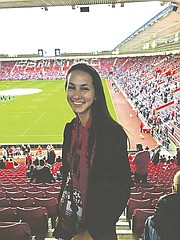Bahamian students are looking beyond north America to further their education these days. Alexander Hawkins canvasses views of British universities as a viable alternative.
Much like the ebb and flow of the tide on the beautiful sands of the Bahamian beaches, there is an element of predictability when it comes to the education of the country’s best and brightest.
From the frozen tundra of Canada to the warmer climes of Florida, most Bahamian students choose to pursue their higher education in North American institutions.
This might come as no surprise considering the proximity and the high standard of education at many of the universities on the continent, but in recent years there has been a branching-out of sorts. Universities in the United States and Canada are not without their problems and a few young Bahamians have decided to try their luck on the other side of the ‘pond’.
While clearly offering fewer university options than Canada and the United States, the United Kingdom punches well above its weight in terms of university rankings. The Times currently ranks three British Universities - Oxford, Cambridge and Imperial College, London - in the top ten in the world, three more than the entire continent of Asia.
The Tribune caught up with eleven of these brave students, with the aim of understanding the motivations, experiences, achievements, and drawbacks that go with being a Bahamian studying in Britain. The students interviewed are spread all over the country and study subjects ranging from Biochemistry to screen-writing.
Praise for the education and lifestyle at British universities was easy to come by. The logistics of actually attending a university in Britain are seen as more amenable by many of the students here. Wayne Munroe, who studied Geography and International Relations at the University of Sussex, commented that “it was a lot of hassle doing the SAT” to apply to the United States. With the Bahamian educational system based around the BGCSE exam system, this seems like a fair criticism of applying to North America.
The specialisation of the higher education in Britain was the main attraction for Samantha Wilson and Marlena Leonard, who voiced her approval of the exam system rather than the continuous assessment employed in America and Canada. A positive cultural change was also expressed: Wayne Munroe spoke of his enjoyment of experiencing the culture of a European country rather than that of the United States, which is fairly close to home.
The exorbitant prices of university in the United States were concerns for the majority of the interviewed students, and Samantha Wilson expressed a preference for a three-year course. Socially, the legality of alcohol for people under 21 featured as another, albeit less important, improvement on the United States.
Not all Bahamian imports to the British university system have enjoyed their time in Britain completely, with one even being driven to leave after only four months of study. An anonymous student left Regent’s University in London, commenting that she found the work “not challenging enough”, and was made uncomfortable by the student population, who she thought were over-privileged, “wealthy” and differed in personality. While people of wealth is not anathema to the Bahamas, the culture shock was not limited to this student. Marlena Leonard, also at Regent’s, commented on the lack of friendliness shown by the British public. She found no greetings forthcoming on the street or even on entering a classroom! While unthinkable in the Bahamas, this is common practice for the British. While integrating well with English culture at Westminster University, her main concern is the notoriously depressing weather. The pink sands of Harbour Island are a far cry from the sodden streets of Soho or the gloomy, rain-soaked kebab shops of Elephant and Castle in south London.
Clearly adjustments have to be made, even amongst the most adventurous of Bahamian students.
The experience of being educated in a liberal European society may be the most important aspect of Bahamians pursuing their education in Britain. In answer to the question: “Has your experience at university changed your perspectives on Bahamian current affairs and politics?” five of the students described Bahamian politics as “backward”. Concerns about the transparency of government dealings as well as a new-found awareness for the systemic issue of corruption were prevalent in the students’ answers.
Alison Ferguson, of Southampton University, expressed the need for investment in the public education of the Bahamas. In a country with a large percentage of state school students attending university, it is hardly surprising that Bahamians in Britain are beginning to see the need for equal opportunity in their own country.
The need for more liberal social policies were also expressed by many. Issues of abortion, and same-sex marriage were mentioned as well as the establishment of a larger welfare state to care for the needy. With the next generation of Bahamian leaders being educated more and more in Britain, politics in our island nation could well make an unprecedented shift to the left in the coming decades.
It is worth noting that political change from British educated Bahamians is by no means a new phenomenon, with some of the most important figures in Bahamian history having been educated on the other side of the Atlantic. Some notable products of the British university system include Jerome Lightbourne, of King’s, BJ Nottage, who went to Aberdeen, and of course Perry Christie, who attended Birmingham. Considered the “father of the nation”, Sir Lynden Pindling studied a mere hundred yards or so from where I write this article, King’s College London, and is undoubtedly the most influential of Bahamian graduates from a British university. Arguably the most important Bahamian of the 20th century and our first Prime Minister, Pindling’s time in the intellectual milieu of London will have helped the formation of his political convictions and turned him into the man that is so revered by Bahamians.
With two thirds of our country’s Prime Ministers having studied in Britain, it is safe to assume that British education can influence political changes in the Bahamas, and with the current crop of Bahamians displaying clear disgruntlement with the status quo, it is likely that this influence will continue to be felt.
• Alexander Hawkins is a Bahamian second-year student at the London School of Economics studying for a BA in History. He was educated at Tambearly and St Andrew’s School.







Comments
Sickened 7 years, 12 months ago
Great story. Keep them coming!
Abaconian 7 years, 12 months ago
I think all Bahamians should consider pursuing their higher education in the UK (or elsewhere in Europe). It was the best decision I ever made. The people you meet, and the things you will be exposed to are just incomparable to the experience you will have in the US. Let's face it, culture in the USA is.... well.... pretty non-existent. So, if you're looking at cultural enrichment as a part of your university experience I would suggest you look further afield. Plus, university in the UK is relatively cheaper and better. A degree from the UK is also highly regarded in the US if you ever do consider pursuing a career closer to home. Finally, the rest of Europe is right next door just waiting to be explored. It's a no-brainer in my opinion.
Downsides: horrible weather; further from home; high cost of living (especially London); may take time adjusting (as with everywhere).
Advantages: good education and degree options, cheaper university tuition, cheap tickets to rest of Europe, culture, history and generally a more fulfilling experience.
Stapedius 7 years, 12 months ago
Interesting article and happy that you're enjoying your educational experience in the UK. However, I disagree with some of the comments posted. Having the privilege of studying in both the UK and US I think both systems have some unique aspects. It really all depends on where you go. Some universities in the UK are pretty crap where the standards are quite poor. The same goes for the US. Also, it's unfair to say the US has no culture. They may not have the long history of the UK but they have culture. Again, its about what you enjoy and where you are.
Sign in to comment
Or login with:
OpenID